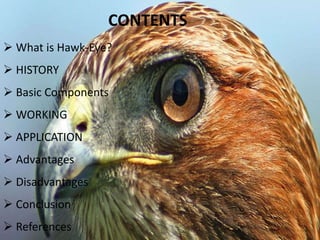Hawkeye
- 1. SEMINAR ON Guided By:- Presented By:- Mr.Deepak Deshmukh Shyam Sharma Mr.Ramakant Prashad MCA 4th sem
- 2. CONTENTS ï What is Hawk-Eye? ï HISTORY ï Basic Components ï WORKING ï APPLICATION ï Advantages ï Disadvantages ï Conclusion ï References
- 3. What is Hawk-Eye? Hawk-Eye is a complex computer system used officially in various sports such as Cricket, Tennis, Football, Badminton, Snooker etc. to visually track the path of the ball and display a record of its most likely path as a moving image.
- 4. HISTORY Hawk-Eye was developed in the United Kingdom at Roke Manor Research Limited by Dr. Paul Hawkins. The system was originally implemented in 2001 for television purposes in cricket. Later, the technology was turned into a separate company, Hawk-eye Innovations Ltd. The system was first used during a Test match between Pakistan and England at Lordâs Cricket Ground , on 21 April 2001. It was first used in tennis 2006 US open.
- 5. Basic Components HAWKEYE system consists of two significant parts: 1. Tracking System : Camera and Speed gun 2. Video Replay System
- 6. Tracking System It calculates the following information:- 1.The speed of the ball leaving the bowlerâs hand. 2. The swing of the ball from the bowlerâs hand to where the ball pitched. 3.How much the ball bounced. 4.How much the ball deviated sideways off the wicket
- 7. Speed Gun A speed gun measures the ball speed. It shoots a very short burst of infra-red laser and receives it back same as the RADAR works.
- 8. HAWKEYE CAMERA The camera record the movement of ball at the rate of more than 200 frames per second.
- 9. WORKING 1.Camera Calibration The process is started with the Calibration of the cameras .This is required to deal with the problem about the non-uniform distance of the cameras from the Ball. 2.Start Processing âĒThese include a statistical generator, which is used to produce statistics based on the data collected. âĒThis data is crucial as it can help the ball detection algorithm to predict the rough location of the ball in an image given the position in the previous image . 8 Camera Calibration Start Processing Ball Recognition Geometry Algorithm 3D Position of Ball Track Of The Ball Predicted Flight Of The Ball
- 10. Ball Recognition ï§An algorithm is used to find the pixels corresponding to the ball in the image obtained. The information is used to achieve the size and shape of the ball. ï§A blob detection scheme is used to detect a round object in the image. ï§Geometric Algorithm is used to look at multiple images and then combine them cleverly to get the coordinates of a ball in 3D.
- 11. Principle of HAWKEYE Triangular Method: Triangulation is a process of determining the location of a point by measuring angles to it from either end fixed at baseline.
- 12. 3D Position of the Ball
- 13. Tracking the ball at various instants âĒ The images are taken by cameras at times t0, t1.....tn during the play of a single ball. âĒ Computation done at each time instant ti, 0 <= i <=n, we will get n points say (xi , yi , zi) for 0 <= i <= 0. âĒ Plot the n points.
- 14. Predicting the flight or path of the ball ï§There is a standard technique, used commonly in the field of Computer Aided Geometric Design. ï§This allows us to draw a good approximation as required to the original curve, passing through the given points. ï§It helps in judging the decision of LBW .
- 16. Wagon Wheels The trajectories which the ball has taken after being hit by the batsman are recorded in the system. This is used to generate a graphic showing 1s, 2s, 3s, 4s, and 6s all in different colours for a batsman.
- 17. Pitch Maps As shown above, the Pitch Map graphic uses information about the position where the ball bounced on the pitch.
- 18. Other Sports Tennis Hawk-eye was first used in tennis in the year 2006( US open ). In tennis Hawk-eye generates the impact of the ball whether the ball is âINâ or âOUTâ the line of tennis court. There are appx. 8 to 10 high speed HAWKEYE camera at a speed of more than 200 FPS/s for images, easy to capture the tennis trajectories and placement of the data.
- 19. FOOTBALL âĒIt is used in Football to judge whether it is goal or not. Hawk-Eye install 7 cameras per goal. âĒWatch used by the Referee in Football also used Hawk eye Principal. âĒControl software combines the information from all cameras and is able to track the ball within the goal area. âĒAs soon as the system detects that the ball has crossed the goal line, it instantaneously sends a signal to the officialâs watch.
- 20. ADVANTAGES Give a prediction as accurate as 99.99 percent. Its a very effective system which works in real time. Minimize the chances of human error in decision making. Help players to study their past games and improve.
- 21. DISADVANTAGES The system is too costly. The system needs complex arrangements. Sometimes Hawk-Eye struggle with predicting the curved trajectory of a cricket ball after bouncing. Sometimes it challenges umpires dignity.
- 22. CONCLUSION After all the test that have been conducted on this technology, it has always come out successful and it promises to be a boon for the world of sports and now it is upto the different councils to decide whether to use this technology or notâĶâĶ.
- 25. ? Questions

























